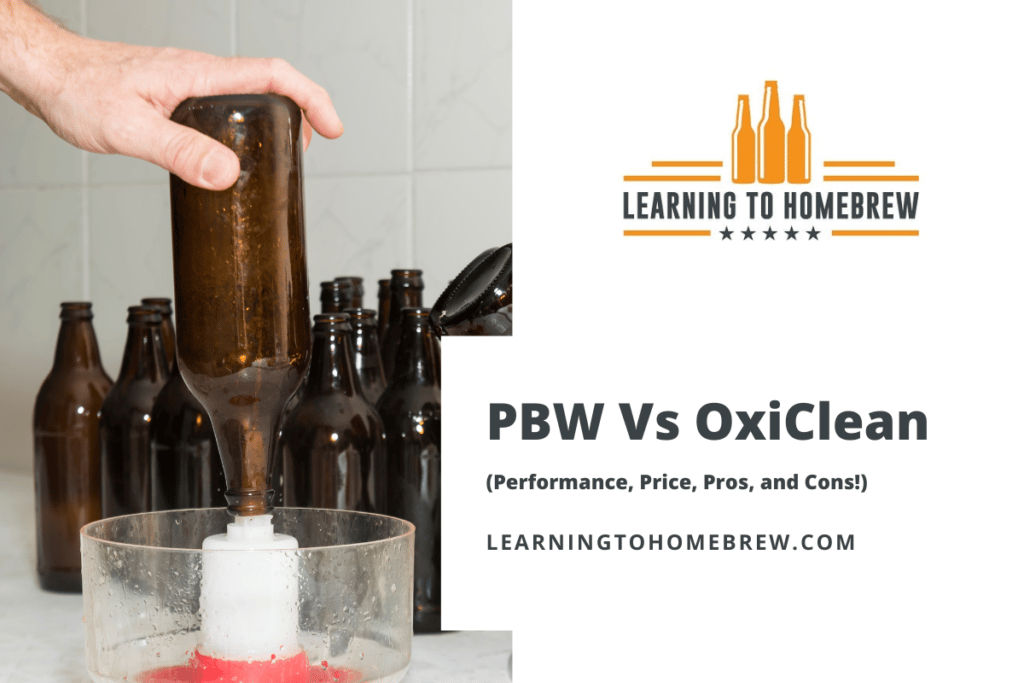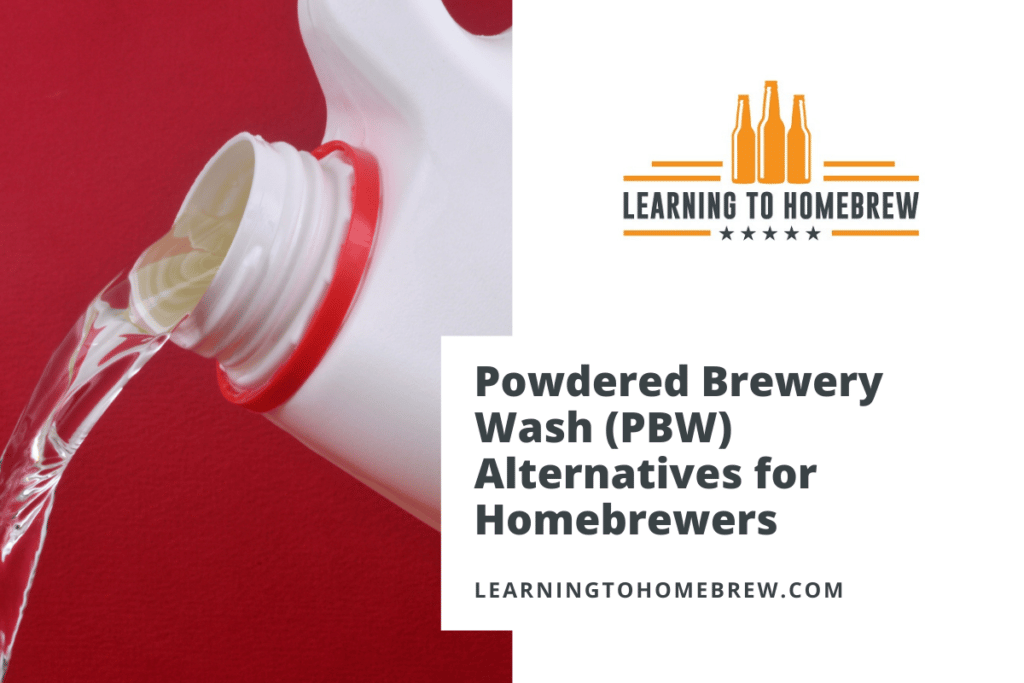Powdered Brewery Wash, better known as PBW in the homebrewing community, is a popular choice for cleaning homebrewing equipment. What is it, and how does it work on various materials?
PBW is a safe, environmentally friendly cleaner from Five Star Chemicals that was formulated for the beverage industry to clean organic material from stainless steel, copper, aluminum, plastic, and PVC tubing. It is easy to use, safe on the skin and rinses easily.
Continue reading for more on why Powdered Brewery Wash is an effective cleaner, what materials it can clean, and applicable safety measures when using PBW.
Topics We Cover
What is Powdered Brewery Wash (PBW)?
Powdered Brewery Wash, or PBW for short, is a patented alkali cleaner specifically formulated for brewing equipment. It is an easy-to-use, readily available homebrewing cleaner that can clean a variety of materials and surfaces.
It was created by Five Star Chemicals, a company that has been servicing breweries, wineries, distilleries, and other beverage-related businesses since 1980. Originally used exclusively by Coors, it is now widely available for homebrewers and large commercial breweries alike.
According to Five Star, PBW is “a non-caustic, non-corrosive, environmentally and worker-friendly, safe to use, alkaline cleaner that has been found to outperform other caustic based cleaners.”
In addition, Five Star Chemicals lists PBW as:
- Cleaner is very effective in removing thick, difficult, and caked-on organic soils.
- Effective substitute for caustic soda cleaners and household cleaners.
- Can clean items that cannot be reached with a brush or sponge by simply soaking and rinsing.
- Safe on skin as well as stainless steel, rubber, soft metals, and on plastics.
PBW contains many of the same ingredients as other commercial cleaners, with the addition of sodium metasilicate, which is effective at removing organic matter. The sodium metasilicate sets PBW apart from other commercial cleaners, safely boosting the efficacy of detergents.
You can find PBW online, at local homebrew stores, and occasionally at Walmart or Target. While it is slightly more expensive than other cleaners, not only is it a superior formula, you also do not need to use much at a time, so one container will last a while.
- PBW is an alkaline, non-caustic, environmentally and user friendly cleaner
- Cleaner is very effective in removing thick, difficult, and caked-on organic soils
- Safe on skin as well as stainless steel, rubber, soft metals, and on plastics
Prices pulled from the Amazon Product Advertising API on:
Product prices and availability are accurate as of the date/time indicated and are subject to change. Any price and availability information displayed on [relevant Amazon Site(s), as applicable] at the time of purchase will apply to the purchase of this product.
Is PBW a sanitizer?
Powdered Brewery Wash is not a sanitizer, it is a cleaner. Five Star Chemicals describes PBW as a “full-spectrum cleaner for all types of organic soil, proteins, and stains on a broad range of equipment.”
Five Star Chemicals produces separate sanitizers, including
Is PBW bad for your skin?
If used properly PBW is safe on the skin.
Dilute the PBW according to package instructions and thoroughly wash off of skin with soap and water after use.
As some people have more sensitive skin than others, you may experience mild irritation or no side effects at all after coming into contact with Powdered Brewery Wash. While gloves are not required when using PBW, gloves are safe to use if you are concerned about skin irritation.
If PBW comes in contact with your eyes, rinse gently with water for several minutes, removing contact lenses if applicable. Seek medical help if there is prolonged irritation following rinsing.
For more safety information, refer to this sheet provided by Five Star Chemicals.
Does PBW need to be rinsed?
PBW must be rinsed off with warm water after cleaning. At best, PBW can cause off-flavors in beer if left unrinsed, and at worst, it is unsafe for consumption.
IF INGESTED: Rinse out your mouth with water and do not induce vomiting. Call Poison Control or seek medical help.
How is PBW used for homebrewing beer?
Powdered Brewery Wash is used to clean brewing equipment. It is an alkaline, non-caustic, environmentally and user friendly cleaner specifically formulated for brewery equipment and the beverage industry.
PBW is highly effective at cleaning brewing equipment without causing hard water scaling or leaving behind residues after rinsing. In addition, it contains no dyes or fragrances, so it will not lend off-flavors to future batches of beer if rinsed properly.
PBW easily cleans organic material. The trub left behind after racking beer, as well as stubborn wort and hop residue, are no match for Powdered Brewery Wash. Five Star Chemicals also promises no need for scrubbing.
That means you can easily wash beer lines with PWB without worrying about using a brush or pipe cleaners.
PBW instructions
PBW’s instructions are easy to follow and readily available on Five Star Chemical’s website:
- Rinse off the vessel or surface to get rid of as much soil as possible.
- Dissolve 1-2 ounces per gallon for kettles and 3/4 ounces per gallon for fermenters, kegs, tanks, and other equipment. (May vary depending on soil load)
- If circulation cleaning, heat to 130°-180° F and circulate for at least 30 minutes.
- If soaking, heat to 140° and soak for 4 hours or allow to soak cold overnight.
- Rinse surface or vessel.
PBW is a preferred choice of cleaner for homebrewing equipment because it doesn’t require overly high temperatures in order to clean effectively since it’s non caustic.
Five Star chemicals says the mixed solution is good for about 8-10 hours, and PBW has a shelf life of six months to a year once opened.
PBW cleaner ratio
According to Five Star Chemicals, use 1 to 2 ounces of PBW per gallon for cleaning kettles, and 3/4 ounce per gallon for fermenters, kegs, tanks, and other equipment. You may need more (or additional soaking time) depending on how dirty the items are. You may see this referred to as the ‘soil load’.
Can you use PBW to clean PVC vinyl beer lines?
PBW can be used to clean PVC vinyl beer lines. Soak the beer lines in PBW, rinse, and sanitize before drying. The beer lines should not need to be scrubbed out when using PBW.
What materials can you use PBW to clean?
PBW is a multi-purpose cleaner that can be used on a variety of household materials. In addition to cleaning homebrewing materials, it can also be used to clean out dishwashers and washing machines. Some users have also used Powdered Brewery Wash to clean grill grates, baking sheets, silverware, and the like to penetrate carbon or protein soils.
Is PBW safe on aluminum?
PBW is safe for use on aluminum. It will not oxidize aluminum or leave behind a dark stain like OxiClean, bleach, or similar cleaners. This oxidation is corrosive and can render the aluminum unsafe to use.
Is PBW safe on stainless steel?
PBW is safe for use on stainless steel. PBW is a percarbonate-based cleaner, meaning it will not cause corrosion like bleach can.
It’s a common misconception that stainless steel is incapable of rusting. Stainless steel resists rusting through passivation, a chemical treatment that provides a protective oxide layer. One way to passivate a new stainless steel brew kettle is to clean with PBW and then sanitize with
Is PBW safe on copper?
PBW is safe for use on copper. The solution may turn blue because of chemical properties in the copper, but the copper equipment (such as a wort chiller) is safe with Powdered Brewery Wash.
Many homebrewers have reported this blue solution in a variety of homebrewing message boards and groups, concerned for the safety of PBW on their copper equipment. The chemical reaction that turns the solution blue is not harmful, but it does suggest soaking copper for a shorter amount of time than other materials for best results.
Take note: if the copper has a black or blue-green patina (which can happen naturally), clean off that patina before allowing the copper to come into contact with wort. The patina will otherwise wash off directly into your wort, which can cause off-flavors.
Is PBW safe on plastic?
PBW is safe for use on plastic. The buffering agents and mild alkalis in PBW protects plastic from corrosion.
Is PBW safe on brass?
PBW is safe for use on brass. Five Star Chemicals recommends only using PBW and
IS PBW safe on glass?
PBW is safe on glass. However, it is slippery before thoroughly rinsing, so exercise caution to prevent breaking the glass and causing injury. Here is a useful video on how to clean a glass carboy safely using PBW.




